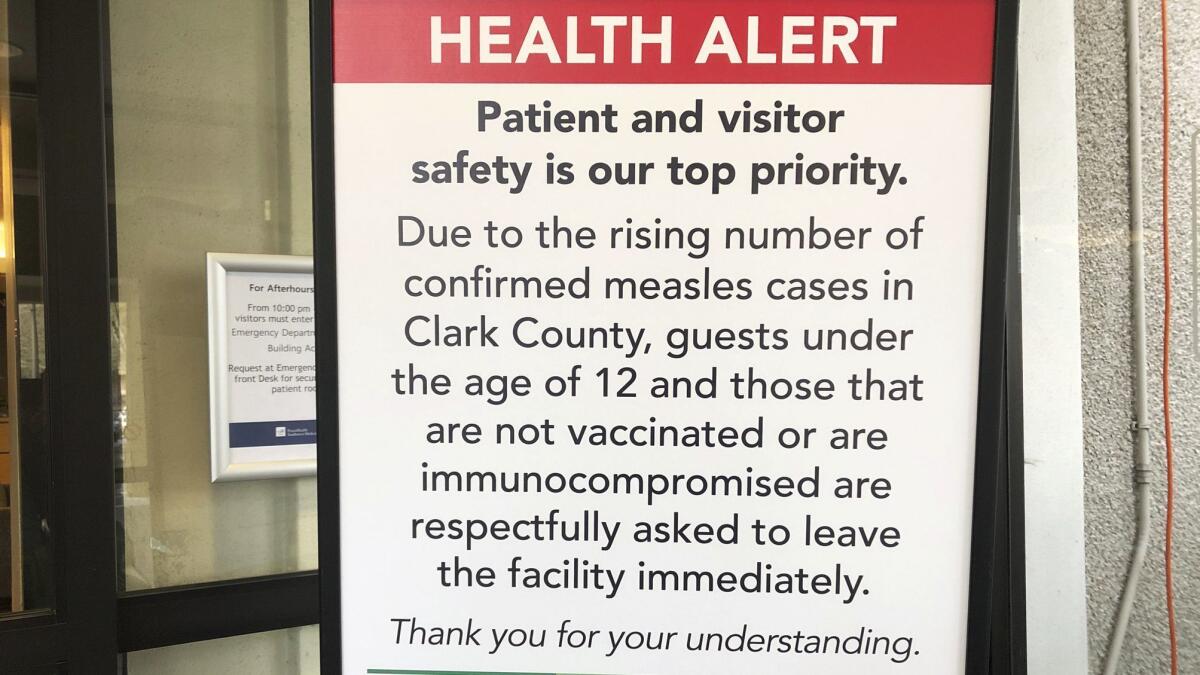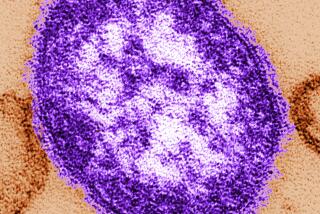Measles outbreak spreads in anti-vaccination Northwest ‘hot spot’

Reporting from Vancouver, Wash. — The number of confirmed measles cases near Portland, Ore., has grown to 31 — an outbreak boosted by lower-than-normal vaccination rates in what has been called an anti-vaccination U.S. “hot spot.”
Public health officials in southwest Washington, just across the Columbia River from Portland, said people may have been exposed to the dangerous disease at more than three dozen locations, including Portland International Airport, a Portland Trail Blazers basketball game, an Amazon Locker location and stores such as Costco and Ikea.
Twenty-six of the confirmed patients had not been vaccinated against measles, and the vaccination status of four others who were infected is unknown, officials said Friday. One child has been hospitalized. Authorities say nine additional cases are suspected.
One case also was confirmed in King County, Wash., which is home to Seattle, and another in Multnomah County, Ore., which is home to Portland.
Most of the cases involved children younger than 10, the Clark County Public Health Department in Washington said in a statement. One adult was infected, and the rest were teenagers. Oregon officials didn’t provide the age of the adult infected there.
Washington Gov. Jay Inslee, a Democrat, declared a statewide public health emergency on Friday. Authorities in neighboring Oregon and Idaho have issued warnings.
Inslee said the number of cases “creates an extreme public health risk that may quickly spread to other counties.”
The measles vaccine has been part of routine childhood shots for decades, and measles had been declared eliminated in the U.S. in 2000.
But measles is still a big problem in other parts of the world. Travelers infected abroad can bring the virus into the country and spread it, causing periodic outbreaks.
Last year, there were 17 outbreaks and about 350 cases of measles in the U.S.
Officials still are not sure where this Pacific Northwest outbreak began. The first known patient sought medical care on Dec. 31, but it is unknown if other people may have gotten sick before that and did not seek treatment. Public health officials are focused for now on preventing more exposures.
It could be weeks or even months before the “exquisitely contagious” virus runs its course in Washington, Dr. Alan Melnick, the Clark County health officer, said.
People who choose not to vaccinate their children are underestimating the dangers of the illness, said Melnick, who said he himself had measles as a child, before the vaccine was commonplace.
Prior to the vaccine, 400 to 500 people died from the measles each year, 50,000 people were hospitalized and 4,000 people developed brain swelling that can cause deafness, he said. Between one and three cases in every 1,000 are fatal, he said.
“It’s one of the most contagious viruses we have. It can have really serious complications ... and it’s entirely preventable with an incredibly cheap and safe vaccine,” Melnick said.
Clark County has already spent more than $100,000 trying to contain the outbreak, and staff is being pulled from other duties, including restaurant inspections, he said.
“It’s all hands on deck. Clearly this is going to cost hundreds of thousands of dollars, and it wouldn’t surprise me if we were in the seven figures by the time we’re done here,” he said. “These costs could have been prevented if we had everybody vaccinated.”
Clark County, which includes the Portland bedroom community of Vancouver, Wash., has a measles vaccination rate of 78%, well below the 92% to 94% rate required for so-called herd immunity, said Marissa Armstrong, the department’s spokeswoman. Herd immunity happens when unvaccinated individuals are protected from infection because almost everyone around them has been vaccinated and is immune to a disease.
Both Washington and Oregon allow vaccine exemptions for personal reasons.
Ninety percent of people exposed to measles who have not been vaccinated will get it, public health officials said.
More to Read
Sign up for Essential California
The most important California stories and recommendations in your inbox every morning.
You may occasionally receive promotional content from the Los Angeles Times.










